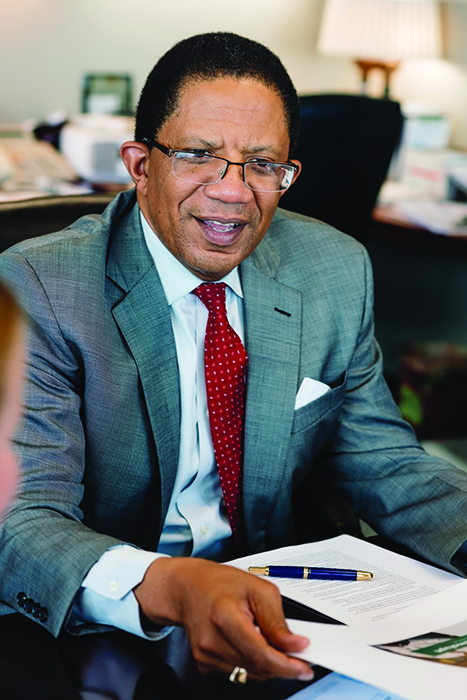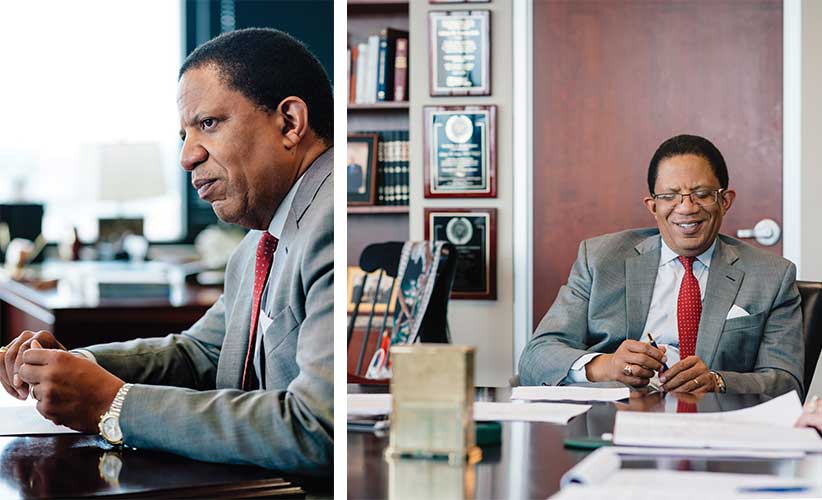 Dr. Selwyn Vickers reflects on five years as dean of the UAB School of Medicine.When you learn of the lengths to which previous generations of the family of Selwyn Vickers, M.D., FACS, went in pursuit of an education, it seems inevitable that his career path would lead him to the office of dean of UAB School of Medicine. His parents, John and Clara Vickers, not only earned college degrees—a rarity for African-Americans living in Jim Crow-era Alabama—but they also both earned master’s degrees in education fields. His father went on to become one of the first 15 African-Americans to earn a doctoral degree from the University of Alabama. He later became dean of the School of Education at Alabama A&M University in Huntsville, where Vickers spent most of his formative years.
Dr. Selwyn Vickers reflects on five years as dean of the UAB School of Medicine.When you learn of the lengths to which previous generations of the family of Selwyn Vickers, M.D., FACS, went in pursuit of an education, it seems inevitable that his career path would lead him to the office of dean of UAB School of Medicine. His parents, John and Clara Vickers, not only earned college degrees—a rarity for African-Americans living in Jim Crow-era Alabama—but they also both earned master’s degrees in education fields. His father went on to become one of the first 15 African-Americans to earn a doctoral degree from the University of Alabama. He later became dean of the School of Education at Alabama A&M University in Huntsville, where Vickers spent most of his formative years.
Vickers’ parents inherited their reverence for learning from their forebears. His paternal grandfather taught himself to read and write at age 44. His maternal grandmother was a college graduate who worked as a school principal in the 1940s, and her father studied under Booker T. Washington.
The influence of family was also key to putting Vickers on the path to a career in medicine. The summer Vickers was 15, he visited his uncle, Leroy Vickers, M.D., in Cincinnati and shadowed him at his internal medicine practice for a week. “To this day I still remember the elderly man with aortic stenosis he took me to see in the hospital,” Vickers says. “His symptoms were he could only walk about a block before becoming really short of breath. My uncle had seen him in the clinic where he was running the practice, and he heard this very distinctive murmur and knew what he had.
“He got him into the hospital and got his valve replaced. The man was still recovering when we went by to see him, but he was so thankful because his quality of life was restored. I saw that man’s face when he saw my uncle, who was probably only 29 or 30 at the time, and I knew then that’s what I wanted to do.”
Following his uncle’s example, Vickers set his sights on medical school early on in high school. He attended Johns Hopkins University for undergraduate, medical school, and his postdoctoral training, during which time he honed in on his two abiding clinical and research passions: pancreatic cancer and health disparities.
Vickers returned to Alabama in 1994 when he joined the UAB Department of Surgery as an assistant professor. He eventually rose to professor of surgery and became the first holder of the John H. Blue Chair of General Surgery, and the co-director of the UAB Minority Health and Research Center. In 2006, he was recruited to the University of Minnesota to become the Jay Phillips Professor and Chair of its Department of Surgery. In 2013, he was recruited back to UAB, this time as senior vice president of medicine and dean of the School of Medicine, and holder of the James C. Lee Jr., Endowed Chair. He continues to perform pancreatic cancer surgeries, and his research has led to the development of important cancer treatments, as well as crucial advances in the understanding of health disparities.
As his fifth year as dean draws to a close, UAB Medicine sat down with Vickers to discuss the progress he has overseen in the school and the improvements still to come, as well as his perspective on the state of health care today and how the system can be strengthened for the future.
What is the most critical problem facing health care today?
 The economics of health care are probably the biggest challenge. We can’t continue to have heath care costs rise where it becomes 20 percent of our GDP, and we’re probably at 16 or 17 percent now. The amount of dollars in health care is likely not going to increase, so fundamentally, we’re going to be asked to do our best for less.
The economics of health care are probably the biggest challenge. We can’t continue to have heath care costs rise where it becomes 20 percent of our GDP, and we’re probably at 16 or 17 percent now. The amount of dollars in health care is likely not going to increase, so fundamentally, we’re going to be asked to do our best for less.
The reason I use those terms is because now, more than ever, we are going to be measured and judged by metrics that can be quantified and reported. Quality, patient satisfaction, complications, unintended deaths, unintended outcomes—all those things are going to be measured, and our charge will be to be better than the rest.
At the same time we are going have to do it in the most economical way possible. We’re going to be asked, did you provide care in a way that allowed you to be efficient and thoughtful in how you use resources?
While that’s happening, our thirst and aspiration for science and discovery is not going away; it’s getting bigger. The amount of money that’s coming in for health care is not increasing, and one of the most expensive parts of an academic medical center—the research enterprise—is becoming more expensive. It’s true that [National Institutes of Health] funding is increasing, but we know that for every NIH dollar, it takes 50 cents from another source to secure that dollar. Yet those other sources that we have in a state like Alabama, or any place for that matter, are going to be fixed based on how well the clinical enterprise does.
Ultimately, I think one of our biggest challenges is the fiduciary responsibility that we have as physician leaders to continually reduce costs, raise the bar of quality, and sustain our vision and aspiration for groundbreaking research to help improve the lives of the people we care for.
What is the most important quality a physician needs to be successful today?
The fundamental characteristics of a good doctor really haven’t changed: You have to love learning science and human physiology, and you have to care about people. But moving forward, the physician workforce is going to have to be reassessed in the context of burnout, and resilience is going to be very important for a person to have a sustainable and successful career in medicine. We know that burnout is a legitimate issue for this generation of doctors who, by expectation and experience, desire and demand different things out of their lives than many of their predecessors did. While doctors will work as hard as they always have, they may not work as intensely over as long hours as they did in the past.
I also think physicians of the future won’t be as much the lone warrior. More and more, they will be part of a larger multidisciplinary group as employed physicians, and they’re going to need multiple team players to help them. Being successful will mean not only being judged by how you interact with your patients, which used to be the only criteria for being a good doctor, but it’s also going to be how you interact with the team around you. Physician extenders, advanced practice providers, pharmacists, physical therapists, occupational therapists—those individuals play a huge role in delivering care in the models that have been shown to reduce costs and provide higher levels of preventive and extended care.
What has changed most about medical education since your days in training?
Four years is just not enough time to get all the knowledge, and the new knowledge that’s being generated, into students’ minds. You could make medical school six years on top of a bachelor’s degree because of the explosion of knowledge. There’s one report that says 90 percent of the data in health care has been created the past two years. That’s the biggest difference—the accumulation of information and data and the speed at which it occurs.
In other ways, things haven’t changed much. You’re still required to work hard; you’re still required to push yourself to a level you’ve never had to before, especially in the first two years of medical school. But the rewards are immeasurable; you’re doing something that can really impact a patient’s life.

What do you think surprises outsiders most about the School of Medicine and UAB Medicine?
The thing I think is most surprising that we continually overcome is that who we are and what we do is often seen as incongruent with people’s perceptions of Alabama. Our size, our scope, and our aspirations are not consistent with the world’s impression of our state. That’s in some ways advantageous and in other ways unfortunate. We have to bring people here in order to change their fixed, often false beliefs.
We grow our reputation capacity for excellence in research and patient care largely on who we can recruit, both students and faculty. Getting the best in the country is what allows us to compete on a national playing field and be an institution that is viewed as a serious competitor.
What do you hope people will remember most about your tenure as dean?
If not seen as transformative, I hope I will be remembered as someone who added value as a leader, who helped lift our programs, solved problems, and increased opportunities.
By Jane Longshore and Laura Coulter
Photography by Dustin Massey